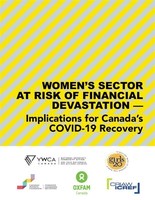The survey revealed that 51% of organizations had to cut back on vital services and 48% had to cancel some of their programming all together. Part of the challenge has been delivering programs and services remotely during a pandemic -- 1 in 5 organizations reported that the lack of internet access and digital devices for clients was one of the biggest barriers to supporting vulnerable communities.
As one survey respondent from a rural Francophone community shared, "The loss of contact with the community is a major setback for us. We will have a lot of work to do after the pandemic, despite all our adaptations and efforts. The internet is not accessible to everyone, and not everyone knows how to get connected (especially with the more isolated or older segments of the population)."
Paulette Senior, CEO and President of Canadian Women's Foundation, highlighted, "Organizations have been doing everything they can to continue to serve women through the pandemic. This survey holds many important messages about what they need most. It's especially concerning that close to 40 per cent have not been able to access any kind of emergency funding. Everything must be done to close this gap in the coming months."
Other findings include:
- Unexpected costs and expenses that are challenging to cover due to project funding limitations
- Inability to access emergency COVID-19 funds
- Reduction and cancellation of vital community programs and services like counselling
- Lack of digital capacity and adaptability to manage remote service delivery
Funding was one of the most significant issues facing organizations at this time. Relief funding was inaccessible with 2 in 5 organizations reporting they could not access it either due to not meeting funding criteria or not having the capacity to apply. "We honestly do not have the time to research and apply for many of these [government funding support] because we are still on the frontlines of trying to deliver services and complete projects. We don't have the capacity", one respondent shared. 25% of organizations pointed out that unrestricted funding was what was necessary at this time in order to have greater flexibility to address unexpected challenges.
Jackie Neapole, Executive Director of the Canadian Research Institute for the Advancement of Women (CRIAW) shared, "The pandemic has had a disproportionate impact on women and the survey findings show how this pandemic has also worsened the already precarious position of women's rights organizations. Providing essential services, generating feminist analyses and research, and advocating for policy changes are all crucial for addressing the pandemic's disparate impacts on women---but without immediate financial stabilization the sector is at risk of collapse and the government's past investments in the sector will be wasted."
Bailey Greenspon, acting Co-CEO of G(irls)20 added, "The programs and services that have been cut are supposed to have the effect of leveling the playing field for women and non-binary people. Without access to these programs, which span from leadership training to sexual violence services, Canada is facing decades, and possibly generations, of lost progress made towards gender equality."
During this difficult time, the organizations that show up for communities are at risk of shutting down unless action is taken. In light of these survey findings, YWCA Canada, Canadian Research Institute for the Advancement of Women (CRIAW), Canadian Women's Foundation, G(irls)20, and Oxfam Canada recommend the Government of Canada take the following actions:
- Provide an immediate secure, low-barrier, accessible fund during the COVID-19 pandemic that can be used by women-serving agencies and women's rights organizations to cover overheads and essential operational costs to release pressure of existing project funding and downturns in fundraising, to ensure their ongoing survival.
- Provide core funding to women-serving agencies and equity-seeking organizations to support continued advances in gender equity in Canada moving forward at a time when the pandemic threatens to roll back decades of progress.
- Establish better data gathering and analysis on the women's sector's challenges, led and informed by the sector in partnership with Women and Gender Equality (WAGE) to better understand the challenges the sector faces and to develop solutions that are based on the realities of these organizations. These data and analysis would help inform funding and programming gaps.
- Ensure organizations can have full access to high speed wifi and quality broadband wherever they are, without paying extra and excessive dividends for these services. Digital access is essential in COVID-19 both for organizations that are cash-strapped and for communities that have been left out of the existing services, such as rural, remote and northern communities. The government must accelerate plans to improve and extend reasonably-priced digital capacity throughout Canada.
- Ensure that all existing gains made in policy to advance women's rights and gender equality are sustained and protected against rollbacks and backlash. Continue to maintain the role of the federal government to enshrine and enhance progress for all women, by prioritizing a gendered intersectional framework for analysis.
The online survey was available in both official languages and received a total of 89 responses in English and 28 responses in French. The survey was conducted in October 2020.
For more information on this initiative including full survey results and policy recommendations, please visit: https://ywcacanada.ca/take-action/act-now/take-action-for-the-womens-sector/
SOURCE YWCA Canada

For media inquiries, please contact: Anjum Sultana, Director of Public Policy & Strategic Communications, YWCA Canada, [email protected] | 647 205 3079
Related Links
http://www.ywcacanada.ca


Share this article